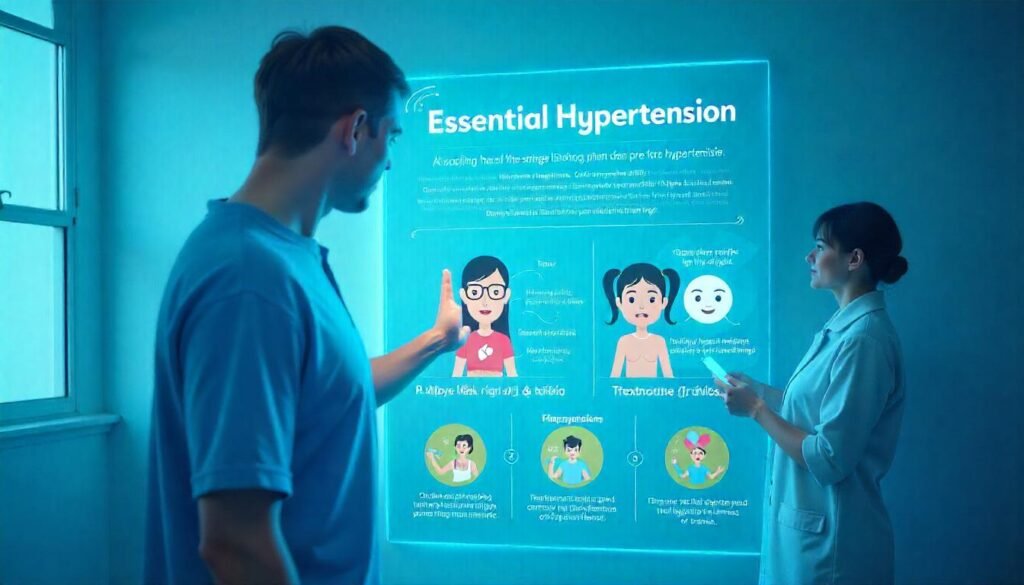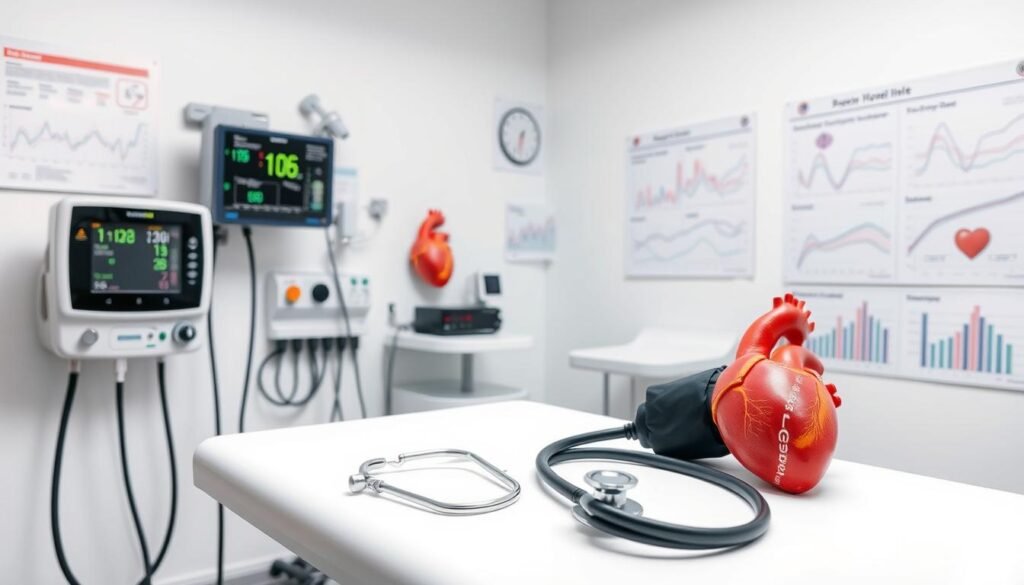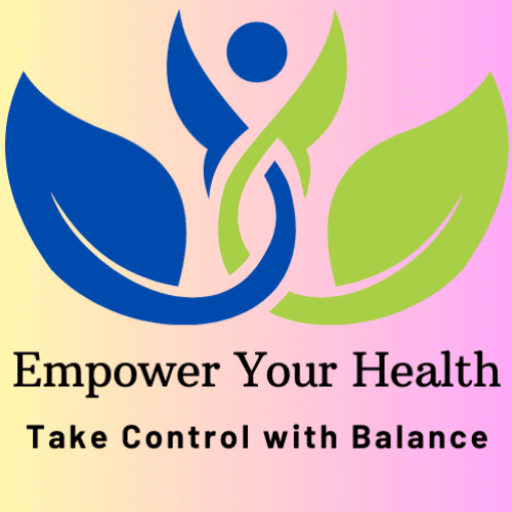As I sit here, feeling my heartbeat, I think about our body’s balance. High blood pressure, or hypertension, is a silent threat to millions. It often goes unnoticed until it’s too late. But, by knowing the causes, symptoms, and treatments, you can control your health and avoid its dangers.
Let’s explore essential hypertension together. We’ll learn how to live a healthier, more vibrant life.

Table of Contents
Key Takeaways
- Essential hypertension is a common and potentially serious condition that affects millions globally.
- Understanding the primary causes, such as genetic factors, environmental triggers, and lifestyle contributors, is crucial for prevention and management.
- Recognizing the warning signs and symptoms can help individuals seek timely medical attention and intervention.
- Effective treatment options, including medications and lifestyle changes, can help manage high blood pressure and reduce the risk of long-term complications.
- Adopting preventive strategies and making proactive health choices can empower individuals to maintain healthy blood pressure levels and improve their overall well-being.
Understanding Essential Hypertension
Essential hypertension, also known as primary hypertension, is the most common type of high blood pressure. It’s a long-term condition where blood pressure stays high without a clear cause. Knowing about essential hypertension is key to managing it well.
Definition and Medical Classification
The American Heart Association says essential hypertension is when blood pressure is 130/80 mm Hg or higher in adults. This helps doctors diagnose and treat it right.
Primary vs. Secondary Hypertension
It’s crucial to know the difference between essential and secondary hypertension. Essential hypertension has no known cause. Secondary hypertension is caused by another health issue, like kidney disease or hormone problems. Knowing the type helps find the best treatment.
Global Impact and Statistics
Essential hypertension is a big problem worldwide. The World Health Organization says 1.13 billion people have it, mostly in low- and middle-income countries. The number of people with essential hypertension keeps going up, showing we need to do more to prevent and manage it.
Understanding essential hypertension helps doctors and the public tackle this common condition. It’s important for our health and well-being.
Common Risk Factors for High Blood Pressure
It’s important to know the common risk factors for high blood pressure. This knowledge helps keep your heart healthy. Some key factors include:
- Age – The risk of high blood pressure goes up with age, especially after 65.
- Family History – If your family has high blood pressure, you might get it too.
- Obesity – Being overweight, especially around the middle, strains your heart and blood vessels.
- Sedentary Lifestyle – Not moving much can lead to weight gain and high blood pressure.
- High Sodium Intake – Eating too much salt makes your body hold more water, hardening your heart and blood vessels.
- Stress – Long-term stress can change your hormones, raising your blood pressure.
Knowing these hypertension risk factors helps you take care of your blood pressure. You can make lifestyle changes to prevent or manage high blood pressure.
| Risk Factor | Description |
|---|---|
| Age | The risk of hypertension increases with age, especially after 65 years old. |
| Family History | Genetics play a significant role, as those with a close relative with hypertension are more likely to develop the condition. |
| Obesity | Carrying excess weight, especially around the midsection, can put extra strain on the heart and blood vessels. |
| Sedentary Lifestyle | A lack of regular physical activity can contribute to weight gain and other risk factors for hypertension. |
| High Sodium Intake | Consuming too much salt can cause the body to retain fluid, increasing the workload on the heart and blood vessels. |
| Stress | Chronic stress can lead to hormonal changes that can elevate blood pressure over time. |
“Identifying and addressing these common risk factors is the first step in maintaining healthy blood pressure levels and reducing the risk of developing hypertension.”
Key Causes of Essential Hypertension
It’s important to know what causes essential hypertension to manage and prevent it. This condition, also known as primary hypertension, comes from genetics, environment, and lifestyle.
Genetic Factors
Research shows genetics play a big role in hypertension causes. If your family has high blood pressure, you’re more likely to get it. Some genes can affect how your body controls blood pressure, leading to essential hypertension.
Environmental Triggers
Things like pollution, noise, and stress can also cause essential hypertension. Pollution can lead to inflammation and harm blood vessels. Too much noise can upset your body’s stress response, raising blood pressure.
Lifestyle Contributors
- Bad diet: Eating too much salt, saturated fats, and sugar increases hypertension causes.
- Sitting too much: Not moving enough can lead to weight gain and heart problems, both risk factors for essential hypertension.
- Drinking too much: Excessive alcohol can harm blood pressure control, leading to high blood pressure.
- Chronic stress: Long-term stress can keep blood pressure high.
Knowing the causes of essential hypertension helps you take steps to lower your risk. You can do this by changing your lifestyle and, if needed, getting medical help.
Recognizing Warning Signs and Symptoms
Hypertension symptoms are often called the “silent killer.” Many people with high blood pressure don’t show any obvious signs. This makes it hard to catch the condition early.
Some common signs include persistent headaches. These headaches are usually dull and feel like they’re in the back of the head or temples. People might also feel dizzy or lightheaded, especially when they stand up fast.
Vision problems can also be a sign of high blood pressure. This is because high pressure can harm the small blood vessels in the eyes. This can lead to blurry or distorted vision.
Not everyone with high blood pressure will show these symptoms. In fact, many people won’t show any signs at all. That’s why it’s so important to get regular blood pressure checks.
“Hypertension is often called the ‘silent killer’ because it can go undetected for years, leading to severe health complications if left untreated.”
Knowing the potential hypertension symptoms and getting medical help quickly is key. This way, people can tackle their high blood pressure early. It helps reduce the risk of serious health problems later on.

How Blood Pressure Measurements Work
Measuring blood pressure is key in spotting and handling high blood pressure. Knowing how these measurements work can help you understand your heart’s health.
Systolic vs. Diastolic Pressure
Blood pressure is based on two main parts: systolic and diastolic pressure. Systolic measures your heart’s contraction force. Diastolic measures your heart’s relaxation force. Together, they show your blood pressure levels.
Understanding Blood Pressure Readings
A blood pressure reading is shown as two numbers, like 120/80 mmHg. The first number, 120, is systolic pressure. The second, 80, is diastolic pressure. Normal blood pressure is under 120/80 mmHg.
Home Monitoring Tips
- Use a well-calibrated home blood pressure monitor for accurate readings.
- Take measurements at the same time each day, preferably in the morning and evening.
- Sit quietly for 5 minutes before taking a reading, with your arm supported at heart level.
- Record your readings and share them with your healthcare provider to help with hypertension diagnosis and treatment.
By learning about blood pressure measurements, you can help monitor your heart health. This way, you can work with your healthcare team to manage hypertension well.
Diagnostic Approaches and Tests
To confirm essential hypertension, doctors use a detailed medical check-up. This includes many blood pressure tests and other exams. They aim to find out if other health issues are causing high blood pressure.
The first step is to get accurate blood pressure readings. Doctors take several readings at different times and places. They also do a full physical check, looking at the heart, kidneys, and other important organs.
- Blood tests: These check kidney function, hormone levels, and other factors.
- Imaging tests: Echocardiograms and CT scans look at the heart and blood vessels.
- Urine tests: A urine sample helps find kidney or adrenal gland problems.
If it looks like high blood pressure is caused by another health issue, more tests might be needed. These could check the adrenal glands, thyroid, or other systems.
“Accurate diagnosis is crucial for effective management of hypertension and prevention of associated complications.”
Doctors use a detailed approach to diagnose and treat essential hypertension. This way, they can create a treatment plan that works for each person. It’s all about keeping the heart and blood vessels healthy for the long term.

Medical Treatment Options
Managing essential hypertension often means using a mix of medicines and lifestyle changes. Doctors create treatment plans that fit each patient’s needs and health.
Common Medications
Many medicines help lower blood pressure. These include:
- Diuretics, which help the body get rid of extra fluid and sodium
- ACE inhibitors, which make blood vessels relax and ease heart strain
- Angiotensin II receptor blockers (ARBs), which also widen blood vessels
- Calcium channel blockers, which stop calcium from entering heart and blood vessel muscles
- Beta-blockers, which slow the heart rate and reduce its force
Treatment Plans
The right medicines and doses depend on many factors. These include blood pressure, overall health, and more. Treatment plans may change over time to work better.
| Medication Class | Examples | Mechanism of Action |
|---|---|---|
| Diuretics | Hydrochlorothiazide, Furosemide | Increase fluid and sodium excretion |
| ACE Inhibitors | Lisinopril, Enalapril | Inhibit the production of angiotensin II, a substance that constricts blood vessels |
| ARBs | Losartan, Valsartan | Block the action of angiotensin II, preventing blood vessel constriction |
| Calcium Channel Blockers | Amlodipine, Nifedipine | Prevent calcium from entering the muscle cells of the heart and blood vessels, causing them to relax |
| Beta-Blockers | Metoprolol, Atenolol | Reduce the heart’s workload by slowing its rate and decreasing the force of its contractions |
Managing Side Effects
Some people may feel dizzy, tired, or have stomach problems from medicines. It’s important to talk to your doctor about any side effects. They can adjust your treatment or suggest ways to handle these issues.
Working together, patients and doctors can find the best way to manage hypertension treatment for essential hypertension.
Lifestyle Changes for Blood Pressure Management
Managing high blood pressure is more than just medication. A healthy lifestyle is key to controlling hypertension and keeping your heart healthy.
Eating a heart-healthy diet is a big step. Eat more fruits, veggies, whole grains, and lean proteins. Cut down on sodium, saturated fats, and sugars. The DASH diet is great for lowering blood pressure.
- Eat more plant-based foods like leafy greens, berries, and nuts.
- Go for low-fat or non-fat dairy products.
- Avoid processed and high-sodium foods.
Regular exercise is also vital for hypertension management. Try to do 30 minutes of moderate exercise daily. This can be brisk walking, cycling, or swimming. Strength training can also help lower blood pressure.

Managing stress is important for those with high blood pressure. Try meditation, deep breathing, or yoga to reduce stress and lower blood pressure.
Keeping a healthy weight is crucial for hypertension management. Being overweight can raise blood pressure. Losing a little weight can make a big difference.
“Making lifestyle changes can be challenging, but the benefits for managing hypertension are well worth the effort.”
By making these lifestyle changes, people with essential hypertension can manage their condition better. They can also lower their risk of heart problems.
Complications and Long-term Health Risks
High blood pressure, or hypertension, can cause serious health problems. These issues can greatly affect a person’s health. It’s important to understand these risks to manage the condition well.
Cardiovascular Impact
High blood pressure mainly affects the heart. It puts a lot of strain on the heart. This increases the risk of heart disease, heart attacks, and strokes.
It can also lead to heart failure and aortic aneurysms. These are serious conditions related to high blood pressure.
Organ Damage
High blood pressure can harm other important organs too. It can damage the kidneys and eyes. This can cause kidney disease, renal failure, and even blindness.
People with high blood pressure are more likely to get these serious conditions. It’s important to manage blood pressure to avoid these problems.
Quality of Life Effects
High blood pressure can also affect a person’s quality of life. It can cause chronic fatigue, headaches, and reduced mobility. These issues can make everyday life harder.
Getting the right treatment and making lifestyle changes is key. It helps prevent these problems and improves overall well-being.
| Complication | Risk Increase |
|---|---|
| Heart Disease | 2-3 times |
| Stroke | 2-4 times |
| Kidney Damage | 2 times |
| Vision Loss | 2-3 times |
The table shows how high blood pressure increases the risk of serious health problems. It’s vital to address these risks to keep well and avoid severe outcomes.
Prevention Strategies and Tips
Hypertension, or high blood pressure, is a common health issue. It can lead to serious problems if not managed. But, good news is that you can prevent it with lifestyle changes and proactive steps. Here, we’ll share practical tips to help you control your blood pressure and keep your heart healthy.
Regular Check-ups and Monitoring
Preventing hypertension starts with regular health check-ups. These visits help catch any blood pressure changes early. Also, using a home blood pressure monitor can track your readings and spot any patterns.
Adopt a Healthy Lifestyle
Choosing a healthy lifestyle is key to preventing hypertension. This means:
- Eating a balanced diet with lots of fruits, vegetables, and whole grains
- Staying active with activities like brisk walking, cycling, or swimming
- Reducing salt and sodium in your diet
- Drinking alcohol in moderation
- Quitting or avoiding smoking
- Managing stress with relaxation and mindfulness
Early Intervention for High-Risk Individuals
Some people are more likely to get hypertension due to family history, age, or other health issues. If you’re at risk, talk to your doctor about early prevention. This might include specific lifestyle changes, regular checks, and possibly medication.
| Prevention Strategy | Potential Benefits |
|---|---|
| Regular Check-ups and Monitoring | Early detection and intervention for high blood pressure |
| Healthy Lifestyle Choices | Reduced risk of hypertension and overall cardiovascular health improvement |
| Early Intervention for High-Risk Individuals | Proactive management of hypertension risk factors |
By following these prevention strategies, you can actively work on keeping your blood pressure healthy. Remember, even small changes in your lifestyle can greatly improve your heart health over time.
Conclusion
Essential hypertension is a big health issue with serious effects. Knowing the causes, spotting early signs, and using good management plans can help. People can take steps to keep their heart healthy.
Managing essential hypertension needs a full plan. This includes medical care and changing your lifestyle. Eating right, exercising more, and managing stress can help control blood pressure. These steps can also lower health risks over time.
Handling essential hypertension is a long-term effort. It needs commitment and working with doctors. By staying informed and making smart choices, people can live healthier. They can also lessen the effects of this condition on their health.
FAQ
What is essential hypertension?
Essential hypertension, also known as primary hypertension, is the most common type of high blood pressure. It happens when blood pressure goes up without a clear reason.
What are the main causes of essential hypertension?
Essential hypertension is caused by genetics, environment, and lifestyle. Factors include family history, obesity, not being active, eating too much salt, and stress.
What are the common symptoms of essential hypertension?
Essential hypertension often has no symptoms, earning it the nickname “silent killer.” But, some people might feel headaches, dizziness, or see vision problems as their blood pressure goes up.
How is essential hypertension diagnosed?
Doctors diagnose it with blood pressure checks, physical exams, and sometimes more tests. These might include blood tests, urine analysis, and scans.
What are the treatment options for essential hypertension?
First, doctors suggest lifestyle changes like better diet, more exercise, and stress relief. If needed, they might prescribe medicines like diuretics, ACE inhibitors, or beta-blockers.
How can essential hypertension be prevented?
Preventing it means living a healthy lifestyle. Eat right, exercise, stay at a healthy weight, and manage stress. Regular doctor visits can also help catch high blood pressure early.
What are the potential complications of untreated essential hypertension?
If not treated, it can cause serious problems like heart disease, stroke, kidney damage, and vision issues. Working with a doctor to manage blood pressure is crucial to avoid these risks.



